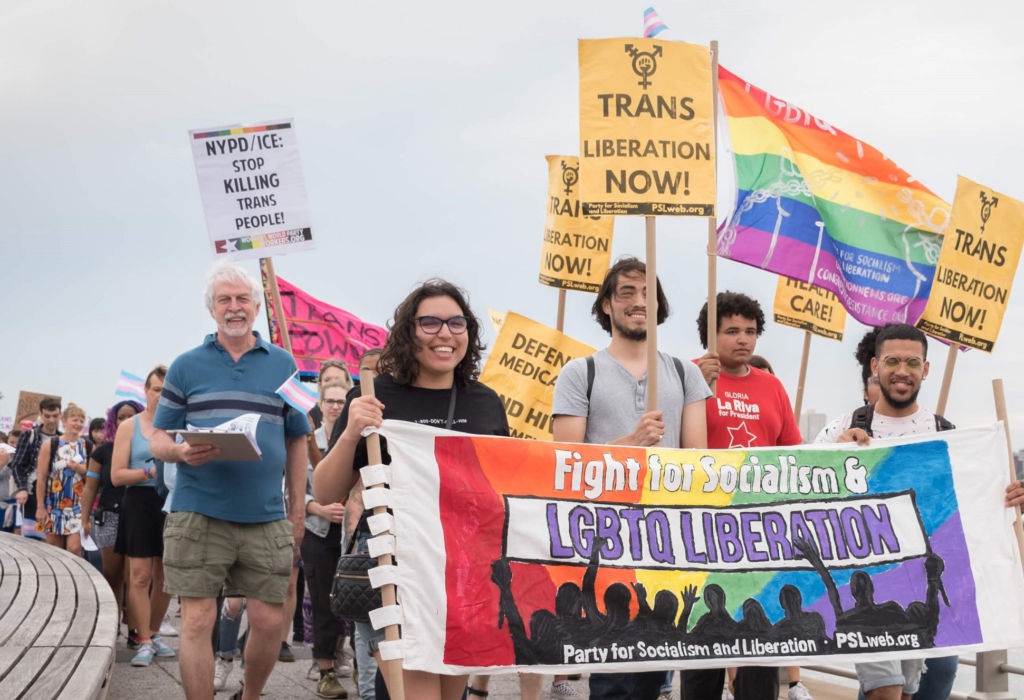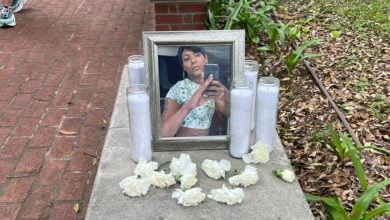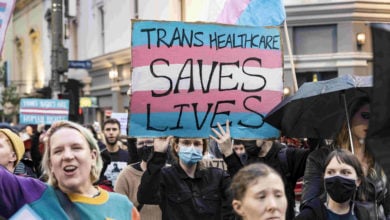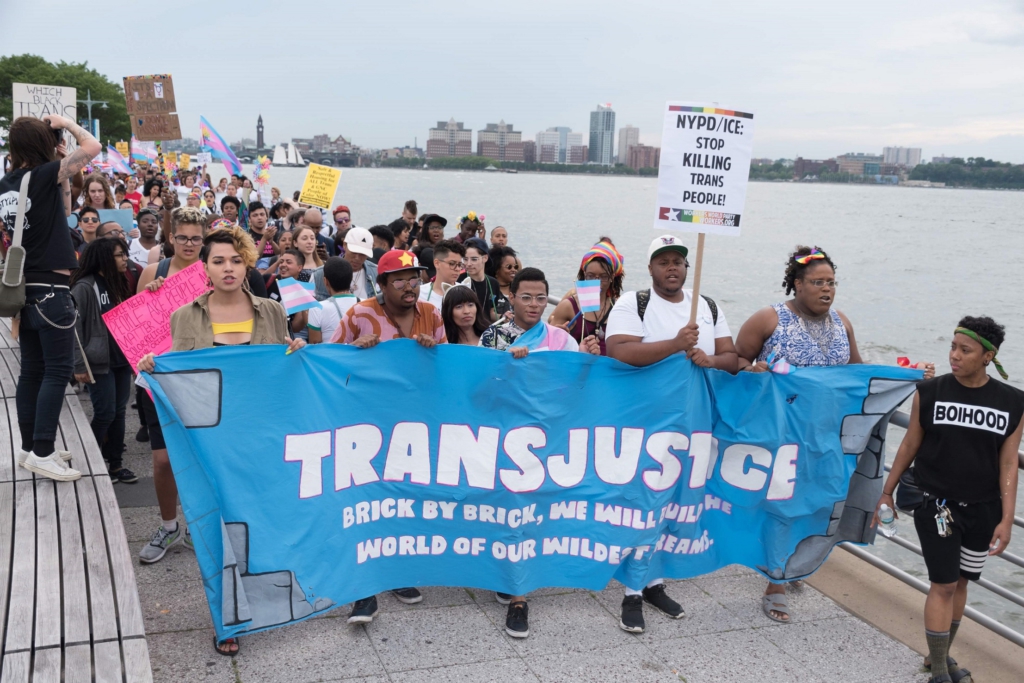
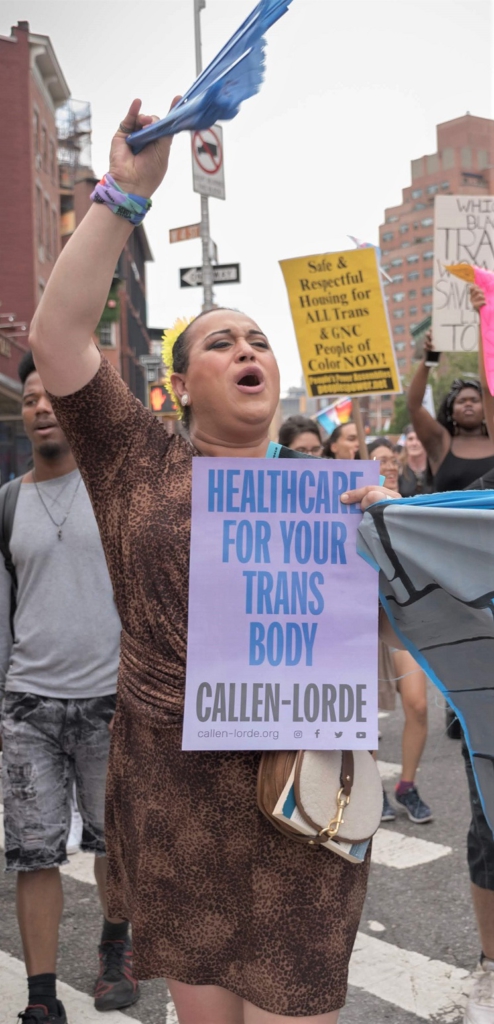
June 22 marked the 14th Trans Day of Action for Social and Economic Justice in New York City, organized annually by TransJustice at the Audre Lorde Project. Each year, organizers from LGBTQ community and advocacy organizations, related grassroots groups, and many individuals, participate in this militant demonstration of people power against transphobia and the systemic oppression of trans and gender non-conforming people. This year the marchers had unparalleled style with flower crowns, trans and rainbow flags, and other Pride gear.
The purpose of the action, according to organizers, was to represent trans and GNC people of color and all allies, and to oppose the systematic oppression that causes immense harm to these communities.
The event highlighted not only bodily autonomy and cultural acceptance, but also the right to live free of police and vigilante violence, and the right to housing and gender-appropriate healthcare. Trans Justice has initiated a campaign called “Brick by Brick,” to get adequate housing for the under-housed Trans and GNC communities.
The event gathered on the Christopher Street Pier, and began with a rally reviewing the activity’s seven points of unity:
Spatial Justice: We envision a world where Trans and gender non-conforming people of color have clear and accessible paths to community ice:ownership and self-determination in the spaces we live, work, and move without fear of harassment, brutality, or displacement.
Body Autonomy: Declaring ownership of our own bodies and their expression is a project rooted in abundance and an affirmation that there are many ways to show up in this world.
Economic Justice: We uplift the inherent value of Trans and Gender Non-Conforming Black, Indigenous, People of Color and call for equitable access to education and employment, protection from employment discrimination, fair wages, and safe working conditions for all workers — especially undocumented workers and people engaged in sex work.
Racial Justice: Black, Indigenous, People of Color (BIPOC) have dreamt of the liberated world and are its ushers into this one which is why liberation must, and will, be fought and won by BIPOC.
Disability Justice: We uplift the inherent value and brilliance of sick, disabled, chronically ill, and neurodivergent folks. We understand our needs, care, and wellness are not luxuries.
Migrant Justice: We demand protections for folks who continue to be impacted by the ever-growing rates of deportation, policing, separation from their family, and detention while seeking home, haven, and asylum.
Prison Abolition: We refuse to accept the path to safety within our communities is by way of putting our people in cages.
Ending violence a crucial issue for participants
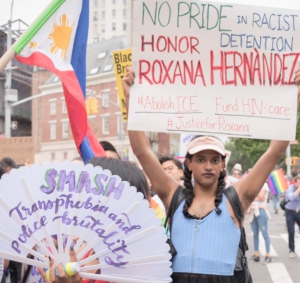
An important focus was the struggle against violence common for Trans queer folks, including mass incarceration, vigilante violence, and state violence. The chair, Liza la Rue, made it very clear that, “We do not believe in relying on police for our protection.” This set the tone for the march of principled unity based on the perspective of trans and GNC people of color.
The rebellion against the police at the Stonewall Inn June 28, 1969, marks the beginning of the LGBTQ struggle and its recognition in Pride month. The full history of Stonewall, however, is often erased. The rebellion against the police was a reaction to the physical gender checks by police in LGBT spaces such as the Stonewall Inn. Had it not been for the bravery of Trans women like Marsha P. Johnson, Pride wouldn’t have come about.
Solidarity from other LGBTQ people is still much needed by trans and GNC people. Liaam told those gathered, “What is still happening to us (trans folks) is unacceptable, especially because New York is indebted to our community.” She explained: “People talk of action, but we don’t feel that it’s happening yet. We feel isolated within the communities that we’re a part of. We feel invisible. We will keep resisting this sexist, misogynistic, transphobic system, but we don’t want words. We want real changes, and it will happen with all of us or with none of us.”
Another speaker, Jourdan, shared their vision for a just world for trans people: “When we look back at our history and trancestors, us Trans people have always created and remade spaces when there was none for us… As a trans person of color, I resist on multiple intersections and multiple forms. Trans justice doesn’t just mean being proud of who we are. It means open access to where we live and work. It means having affordable housing and keeping public land out of private for-profit interests. It means the abolition of borders. It means having the resources to keep the spaces we create for ourselves open. Justice is creating and taking space like we are doing today.”
Spirited and militant, people then marched down Christopher St. to the Stonewall Inn and around Greenwich Village demanding justice. Most of the chants were against police and ICE violence, and in support of people’s power
It was a day of remembrance, celebration, and unity among the multi-gendered, multinational working class participants.
